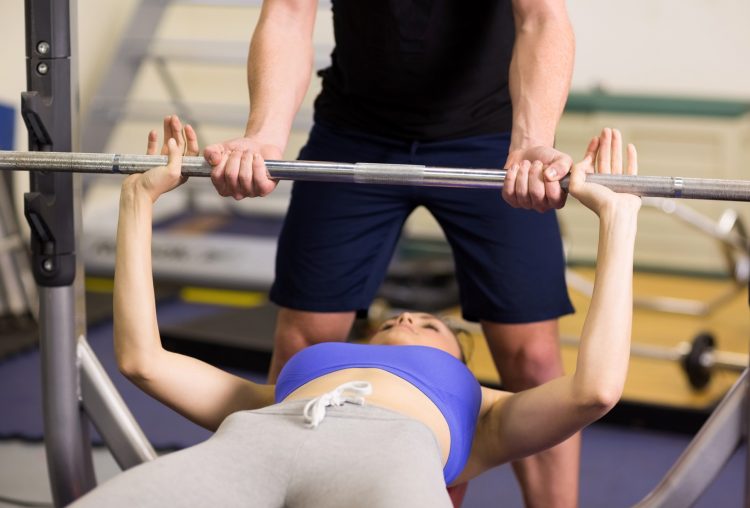A weight on the bench press is too much if you can’t complete more than 1-2 repetitions while maintaining proper form. Remember, focusing on technique and gradual weight increases is safer and more effective than lifting excessively heavy weights.
The bench press is a functional exercise that can help build overall upper body strength. It is also one of the three big lifts in powerlifting, besides the squats and deadlifts.
However, as a personal trainer with over seven years in the field, I can attest that the bench press is among the most abused exercises.
Many lifters let their egos get the better of them while performing the bench press and add more weights to the bar than they can comfortably handle. This not only deprives them of maximal muscle fiber stimulation, but it also significantly increases injury risk.
Bench press injuries are especially common with lifters who try to lift too heavy too soon.
In this article, I will explain everything you need to know about determining an ideal bench press weight and employing progressive overload to help you safely slap another plate onto the bar.
Level Up Your Fitness: Join our 💪 strong community in Fitness Volt Newsletter. Get daily inspiration, expert-backed workouts, nutrition tips, the latest in strength sports, and the support you need to reach your goals. Subscribe for free!
Key Factors That Determine How Much Weight on the Bench Press is Too Much
It’s impossible to say if a bench press weight is too heavy without context.
Ideal bench press weight is highly individual, and your bench press capabilities depend on multiple factors. Understanding these variables can help you assess how much weight on the bench press is too much for you.
Body Weight & Age
An average lifter’s (male or female) bench press performance peaks at the age of 30. It then declines at the rate of 10 percent each decade.
How much you can lift on the bench press also depends on your body weight. Heavier folks can generally lift more than their lighter counterparts of the same experience level.
As a rule of thumb, people who can bench press their own body weight are considered to possess decent upper body strength.
This should tell you that comparing your bench press performance with others is not a good idea. Your fitness journey will always be unique. You must understand the variables behind your performance and adapt your workouts accordingly.
Experience Level
Advanced lifters can generally lift heavier than beginners.
Gym novices should prioritize drilling the exercise movement mechanics. Once you’ve nailed down the form, your next goal should be to lift around half to three-quarters of your body weight. On the flip side, intermediate lifters should aim for a weight that is slightly above their body weight.
Advanced lifters have some experience under a heavy barbell and can aim for two times (or more) their body weight.
Pro Tip: Always use a spotter when aiming for a PR in the gym.
Goals
Each individual has a different aim of joining the gym.
While one lifter might aim to compete in a powerlifting meet, the other might be a recreational lifter. The answer to “How much weight on the bench press is too much for you?” will depend on your ultimate goal.
Form and Technique
The weight you can lift on the bench press hinges on your form and technique.
Here are the things you must consider to nail the bench press form:
- Stable Base: Retract your shoulder blades slightly and plant your feet flat on the floor.
- Arch: This is especially important for powerlifters as an arch can shorten the distance the bar has to travel.
- Bar Path: Use a slightly curved bar path for maximal chest fiber stimulation.
- Leg Drive: Use your legs to generate more power. Most lifters leave gains on the table in this area.
Leverage and Limb Length
No two humans have the exact same biomechanics. Bodies come in all shapes and sizes.
Taller individuals with longer arms face a more extended range of motion, making this exercise a little more challenging for them. Lifters with smaller arms have an advantage on the bench press.
Appropriate Loading For The Bench Press Based on Experience Levels
Knowing the average bench press weights for lifters of varying body weights and experience levels can help you determine how much weight on the bench press is too much for you.
Men’s Average Bench Press By Weight and Experience Level
According to Symmetric Strength, a site dedicated to providing comprehensive lifter analysis based on strength research and data from strength competitions, here is the one-rep max (1RM) bench press standards chart for men:
| Body weight (pounds) | Untrained | Novice | Intermediate | Advanced | Exceptional | Elite | World Class |
| 114 | 70 | 105 | 140 | 200 | 230 | 260 | 290 |
| 123 | 75 | 110 | 150 | 220 | 250 | 280 | 310 |
| 132 | 80 | 120 | 160 | 235 | 265 | 300 | 335 |
| 148 | 90 | 130 | 175 | 225 | 295 | 330 | 365 |
| 165 | 95 | 145 | 190 | 280 | 320 | 360 | 400 |
| 181 | 100 | 150 | 205 | 295 | 340 | 380 | 425 |
| 198 | 105 | 160 | 215 | 310 | 355 | 400 | 445 |
| 220 | 110 | 170 | 225 | 325 | 375 | 420 | 465 |
| 242 | 115 | 175 | 230 | 340 | 385 | 435 | 485 |
| 275 | 120 | 180 | 240 | 350 | 400 | 450 | 500 |
| 320 | 125 | 185 | 245 | 360 | 410 | 460 | 510 |
Women’s Average Bench Press By Weight and Experience Level
Here are the female numbers as per Symmetric Strength:
| Body weight (pounds) | Untrained | Novice | Intermediate | Advanced | Exceptional | Elite | World Class |
| 97 | 45 | 65 | 90 | 130 | 150 | 165 | 185 |
| 105 | 65 | 95 | 125 | 185 | 210 | 235 | 265 |
| 114 | 70 | 105 | 140 | 200 | 230 | 260 | 290 |
| 123 | 75 | 110 | 150 | 220 | 250 | 280 | 310 |
| 132 | 80 | 120 | 160 | 235 | 265 | 300 | 335 |
| 148 | 90 | 130 | 175 | 255 | 295 | 330 | 365 |
| 165 | 95 | 145 | 190 | 280 | 320 | 360 | 400 |
| 181 | 100 | 150 | 205 | 295 | 340 | 380 | 425 |
| 198 | 105 | 160 | 215 | 310 | 355 | 400 | 445 |
| 200 | 105 | 160 | 215 | 315 | 360 | 400 | 445 |
Tally these numbers with your bench press performance to check if you’re pushing yourself too hard in the gym and if your goals are realistic.
Learn about the intricacies of the average bench press in our detailed guide here.
Signs You’re Lifting Too Much Weight on Bench Press

Depending on your fitness and experience levels, there are limits to what your muscles, joints, tendons, and ligaments can handle.
You don’t always need to pop out 1RM charts to establish if you’re lifting too heavy. Here are the cues your body will give you to lower the weights on the bar:
Pain During Exercise
Some lifters have developed the wrong notion that weight training should be hard and painful.
While muscle pumps, lactic acid build-up, and DOMS (delayed-onset muscle soreness) are normal, you should not feel sharp or stabbing pain in your muscles during a set. If that is the case, you should discontinue the exercise immediately and seek professional help.
Alternatively, if the pain is not too bothersome, try lowering the weights and check if the exercise feels any better.
Inability to Complete Reps with Good Form
Partial reps are among the most common telltale signs of ego-lifting. It also limits muscle stimulation, which can hamper your results.
Level Up Your Fitness: Join our 💪 strong community in Fitness Volt Newsletter. Get daily inspiration, expert-backed workouts, nutrition tips, the latest in strength sports, and the support you need to reach your goals. Subscribe for free!
According to a randomized controlled trial, bench pressing with a full range of motion (ROM) is the most effective way to maximize neuromuscular improvements in recreational and well-trained athletes compared with partial ROM reps. (1)
Furthermore, if your chest starts to cave in or your hips lift off the bench on the concentric phase, it is a sign you are lifting too heavy.
Stalling Progress Over Time
In contrast to popular opinion, lifting heavy doesn’t always result in consistent improvements. In fact, lifting too heavy using an incorrect form can lead to muscle and strength plateaus, as it limits muscle engagement.
Lower the weights and re-evaluate your lifting performance if you have hit a wall. Consider taking some time off from training if you are not seeing the desired results from your training.
Secondary Muscle Group Engagement
I have had clients report front delt and tricep muscle pumps during the bench press. This is a cue that you have more weight on the bar than you can handle. The secondary muscles kick in when the target muscle group can’t handle the load.
Stability During the Lift
Some lifters crash the bar on their chest, while others shake uncontrollably on the concentric phase. Both of these are signals that you lack stability and that the weight on the bar is too much. This reduces target muscle stimulation and shoots up your injury risk.
Pro Tip: Learn to listen to your body. I always tell my clients to avoid using their phones or chatting with other people during a workout. It can help develop a better mind-muscle connection and put you in a better spot to pick any cues your body might be giving you.
Consequences of Lifting Too Much Weight on Bench Press
An accident on a compound exercise like the bench press can come with a hefty price tag. Here are some common consequences of going too heavy on the bench:
Acute Injuries via Form Breakdown
Biting off more than you can chew on the bench press can lead to the following injuries:
- Sternum Cracks: Some lifters tend to bounce a heavy bar off their chest to engage momentum. However, this can lead to sternum injuries.
- Rotator Cuff Tears: Lifting too heavy with an incorrect form can lead to excess strain on the rotator cuffs, which are susceptible to tears.
- Pectoral Strains (or Tears): The bench press biases the pectoralis major. Lifting too heavy or a minor slip-up in form can lead to pec strains or tears.
- Shoulder Impingement: Moving heavy weights on the bench press can squeeze and inflame the tendons and bursa within, which could lead to shoulder impingement.
Long-Term Wear and Tear
Make no mistake: Lifting heavy for an extended period will take its toll on your body. You might not see it immediately, but it will catch up sooner or later. Here are a couple of conditions heavy resistance training can lead to:
- Arthritis: It is the swelling and tenderness of one or more joints. The cartilage in the joints wears down, leading to stiffness and pain, particularly later in life.
- Tendinitis and Tendinosis: These conditions occur when the tendons get overworked, inflamed, or begin to degenerate due to the heavy lifting.
Mental Barriers and Loss of Motivation
Most lifters tend to lift heavy to give themselves an ego boost. However, more often than not, the opposite tends to happen.
Missing a rep on a heavy bench press or incurring an injury can turn into a major mental hurdle. You might also end up losing the motivation to train heavy. Plus, injuries require you to take some time off, which can be a setback for your physique aesthetics and strength.
Missed Opportunities for Technique Refinement
When lifting close to your 1RM, the priority is not to use the textbook exercise form. It is to move the weight from Point A to Point B as quickly and efficiently as possible. If you are stuck on a plateau, it is probably because of a technique issue. Trying too hard to hit a PB isn’t going to do much for you in this regard.
Strategies for Finding Your Optimal Bench Press Weight
Now that you have an idea of how much weight on the bench press is too much for you, here are a few ways to find your optimal bench press weight:
Progressive Overload
Whether your goal is to build strength or muscle mass, you must employ progressive overload in your training to build a big bench press.
Progressive overload involves gradually increasing your training volume and intensity by using heavier weights, doing more sets and reps, reducing the rest time between sets, or employing advanced training principles like supersets, dropsets, and intraset stretching.
If you are going the heavier weights route, ensure the weight increments are as small as possible.
Testing Your 1RM
First of all, testing one-rep maxes should be reserved for advanced lifters. Plus, you must attempt a max lift only with a spotter.
There are two popular ways to determine your 1RM bench press weight. The first method involves gradually increasing the weight until you have hit an overhead ceiling. Or, you can use our advanced 1RM calculator to find out how much weight you can lift for a single.
Focus on Technique
I highly recommend beginners work with a personal trainer to master the correct training technique.
Learn about the foot stance, back arch, core engagement, leg drive, shoulder placement, elbow position, line of pull, and hand positioning. A study published in the Journal of Strength and Conditioning found that a narrow grip may be more suitable to bias the triceps and anterior deltoids, whereas a wider grip may be preferable for pectoralis major stimulation. (2)
Periodization
Going pedal to the metal in every bench press workout is not ideal. In fact, it can be counterproductive.
You must constantly vary your training regime by switching up the exercises to make consistent progress. Plus, you must allow your body some time off to optimize recovery.
Advanced exercisers must employ deload weeks into their training regimen. I recommend a deload week after every 8-10 weeks of heavy weight training.
However, you should limit the low-volume training to five days a week as a randomized controlled trial found that a one-week deload period at the midpoint of a nine-week resistance training program appears to negatively influence measures of muscle strength. (3)
Bench Press Variations for Different Fitness Goals
Since you’re reading this article, I’m assuming that you’re trying to build a bigger bench press. While practicing the conventional barbell bench is non-negotiable, adding a few variations to your exercise arsenal can take your gains to the next level.
Here are a few bench press variations for different goals:
Powerlifting (Strength Focused)
You need a strong bench press to post an impressive total in a powerlifting comp. Here are the variations you must include in your workouts:
- Close-Grip Bench Press: It will help you build bigger and stronger triceps, which will improve your lockout strength.
- Paused Bench Press: This variation involves holding the barbell on your chest for 1-5 seconds. This eliminates momentum and forces you to generate raw power.
- Floor Press: It limits the bench press’ range of motion, allowing you to focus on your lockout strength.
Hypertrophy (Muscle-Building Focused)
Lifters aiming to build a barrel chest don’t necessarily need to hit a new PR in each workout. Instead, they must focus on maximizing muscle stimulation by staying in the 8-12 rep range and training the chest from different angles (4). These are three exercises to add to your exercise regime:
- Incline Dumbbell Bench Press: I love dumbbells for chest exercises as they allow an extended range of motion compared to barbells.
- Dumbbell Decline Bench Press: Pull the dumbbells below the ribcage on eccentrics to maximize chest fiber activation.
- Cable Flye: Cables keep constant tension on the target muscles throughout the range of motion, which increases the time under tension (TUT) and promotes hypertrophy.
Beginners and Rehab
Whether you’re just starting your fitness journey or are returning to the gym after an injury, you should start with these bench press variations:
- Push-Ups: Beginners should start with three sets of 10 reps. On the flip side, advanced exercisers can go for three AMRAP (as many reps as possible) sets.
- Band-Assisted Smith Machine Bench Press: Wrap one end of a band around the top of the Smith machine and the other end around the barbell’s sleeves. This will make the concentrics and eccentrics easier.
Conclusion
There is no easy answer to “How much weight on the bench press is too much for me?” Multiple factors dictate the amount of weight you can lift safely. However, if you can’t lift a weight for at least 1-2 repetitions with a picture-perfect form, it is a sign that you’re punching above your weight class.
Lower the weight on the bar and use the techniques explained in this article to build your bench press strength.
If you have any questions about the bench press, drop them in the comments below, and I’ll be happy to help!
References
- Martínez-Cava, A., Hernández-Belmonte, A., Courel-Ibáñez, J., Morán-Navarro, R., González-Badillo, J. J., & Pallarés, J. G. (2022). Bench Press at Full Range of Motion Produces Greater Neuromuscular Adaptations Than Partial Executions After Prolonged Resistance Training. Journal of strength and conditioning research, 36(1), 10–15. https://doi.org/10.1519/JSC.0000000000003391
- Mausehund, L., Werkhausen, A., Bartsch, J., & Krosshaug, T. (2022). Understanding Bench Press Biomechanics-The Necessity of Measuring Lateral Barbell Forces. Journal of strength and conditioning research, 36(10), 2685–2695. https://doi.org/10.1519/JSC.0000000000003948
- Coleman, M., Burke, R., Augustin, F., Piñero, A., Maldonado, J., Fisher, J. P., Israetel, M., Androulakis Korakakis, P., Swinton, P., Oberlin, D., & Schoenfeld, B. J. (2024). Gaining more from doing less? The effects of a one-week deload period during supervised resistance training on muscular adaptations. PeerJ, 12, e16777. https://doi.org/10.7717/peerj.16777
- Schoenfeld BJ, Grgic J, Van Every DW, Plotkin DL. Loading Recommendations for Muscle Strength, Hypertrophy, and Local Endurance: A Re-Examination of the Repetition Continuum. Sports (Basel). 2021;9(2):32. Published 2021 Feb 22. doi:10.3390/sports9020032















